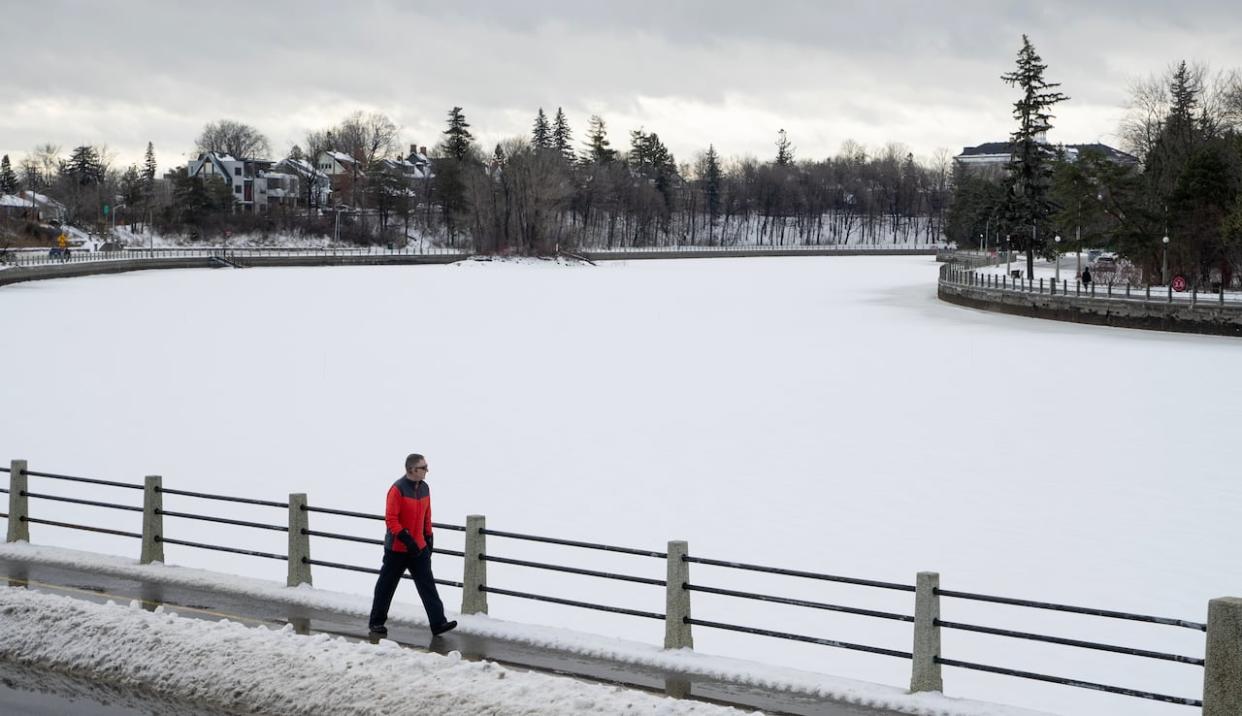It's not all El Niño: Ottawa's warming winters part of longer trend

Warmer weather in Ottawa this winter has meant another year without the full Rideau Canal Skateway, and has delayed the opening of ski trails.
But the lack of really cold weather — there have so far been zero days where the temperature has fallen below –20 C — has the potential to spill over into summer, too.
"I could see it being a good thing for mosquitoes that we're having a winter like this," said Heath MacMillan, a professor in the department of biology at Carleton University.
Frigid temperatures usually kill off more of the dormant mosquitoes waiting in egg form to come out in spring, MacMillan said.
But the frigid temperatures the city is known for so far only showed themselves for a short stint from Jan. 15-21, and December and January came in milder than usual.
While there have been zero days of –20 C in the city so far this winter, there were eight such days last winter, 25 the previous winter, and five and nine respectively the two winters before that.

Heath MacMillan a professor in the department of biology at Carleton University. He says a winter like the one Ottawa has had so far could mean more mosquitos and ticks come summer, though it depends on several factors. (Natalia Goodwin/CBC News )
Insect populations affected
But cold is not the only factor. Whether you'll see more of the insects in a given year can be hard to predict, MacMillan said.
Warmer temperatures could also cause more to die off, as those cause them to use more energy, because their metabolism runs faster when it's warmer.
"They also might be using more energy, and if they're overwintering as an egg, they only have so much energy stored in that egg, they might use it all up and die, but mosquitoes actually are more sensitive to temperature," he said.
Big swings in temperatures that cause a melt and lack of snow cover followed by a cold snap can also kill off more of the population.
But the biggest factor may still be to come, MacMillian said: the amount of standing water we'll have around in the spring from the snow melt, as that's where mosquitos spend the first part of their life cycle.
As for ticks, MacMillian said the population will also depend a lot on the snow cover, which keeps their hibernation spots in the leaf litter insulated, and a cold snap without that cover can kill more.
But in general, he said, warmer temperatures help keep more alive.

Ann Marie Pullen, the managing director of Rochon Gardens, says the lack of cold snaps is good for some of her crops including berries. (Krystalle Ramlakhan/CBC)
Farmers praise warmer temperatures
One group with an eye on summer that is happy with the milder weather is farmers.
Farmers CBC spoke with say it has enabled them to get more jobs done on the farm than during a regular winter, and has been easier on equipment.
For example, when it comes to wild berry varieties that are sitting in a open field, the lack of cold wind is a bonus.
"When it gets super cold and windy, it just freezes it right down to the core and then it gets like a winter burn and then it kills off your plant and then you have to dig it up and replace it," said Anne Marie Rochon, a farmer with Rochon Garden.
"This year we're really hopeful. Like we haven't had that –40, which is great. So we know that they'll be safe and they'll probably, you know, we'll start see them kind of coming back to life in the springtime."
As with the ticks, other farmers, like those who grow winter wheat said a bit more snow could help keep plants insulated and protected in case a cold snap does come our way, which is possible with plenty of winter left.
Warming trend in region
This year's warmer temperatures are getting a boost from the El Niño phenomenon, which will give a somewhat milder than normal winter said Geoff Coulson, a warning preparedness meteorologist with Environment Canada.
"Maybe that influence is going to be a bit stronger and certainly that's been borne out with the numbers we've seen temperature-wise for December and January," he said
But it's not just this year, said Coulson: the long-term data over the last 20 plus years shows a warmer trend. Five of the seven mildest Decembers have occurred since 2001, and this past December came in fourth on that list.
January temperatures show a similar trend, with five of the six mildest Januaries occurring since 2002, and January 2024 coming in sixth.
"Cold air is is going to be around in the winter months in Ottawa, but it certainly looks like in the last 20, 25 years it hasn't made as much of an appearance as it did prior to prior to that," Coulson said

